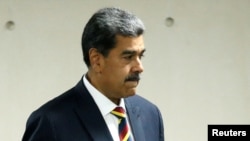More than two weeks after Venezuelan President Nicolas Maduro claimed reelection victory, the U.S. and other Western countries are showing little sign of taking swift, tough action over what many of them have condemned as voting fraud.
Most governments have demanded that Venezuela's National Electoral Council (CNE) release a full set of voting tally sheets after both Maduro and opposition candidate Edmundo Gonzalez declared they won. Brazil and others are trying to secure talks between the two sides.
Protests against Maduro following the vote were met with a crackdown, leaving 23 dead and about 2,400 people arrested, according to the latest U.N. data.
Western governments are trying to "take it slowly," and none wants to move first, said one embassy official who was not authorized to speak publicly.
"This isn't a race to see who can verbally go the furthest in their demands with zero effectiveness, but to be effective in our support for democracy in Venezuela," Spanish Foreign Minister Jose Manuel Albares told a Senate hearing on Tuesday.
European Union foreign policy chief Josep Borrell on Monday urged the release of voting records, the end of political persecution, and a dialogue between opponents. The bloc has not anticipated any action.
Three officials from different countries said the measured response comes as they are mindful of what happened after Maduro's 2018 reelection.
Then, the vote was quickly condemned as a sham and led to the most severe sanctions yet on the OPEC nation. An interim government led by the opposition was widely recognized overseas, but the effort ultimately evaporated, fortifying Maduro in power.
Washington, which blocked Venezuela's critical oil exports under Republican President Donald Trump, seems little appetite for more severe sanctions. Democratic U.S. officials have threatened but so far have held off on new punitive measures.
The Biden administration has been keen not to complicate the way forward for the opposition, led by Maria Corina Machado and candidate Gonzalez, as Venezuelans seek "even small concessions" from Maduro, a person familiar with Washington's thinking said.
Some of those concessions are related to open communication channels between the two sides that the opposition hopes could lead toward an impartial verdict on the election's results and a possible political transition.
A review by Venezuela's Supreme Court will likely take time and may not be impartial given that it is packed by Maduro allies. Repeating the election, another option that might help resolve the dispute, has been dismissed by Machado and advised against by observers, two of the sources said, due to lack of guarantees that it will be done in a safe and trustworthy way.
US cautious
U.S. officials have been reaching out to regional and international partners to organize a coordinated response, the three sources said. Cautiously, the U.S. has recognized Gonzalez as the winner but has not called him the president-elect.
"Now is the time for the Venezuelan parties to begin discussions on a respectful and peaceful transition," said U.S. State Department deputy spokesperson Vedant Patel on Monday.
A spokesperson for the U.S. National Security Council told Reuters on Tuesday that Washington is evaluating what Maduro and his representatives do or not do next and "will respond accordingly."
The Biden government's remaining options appear limited, however. The U.S. reimposed some oil sanctions in April, accusing Maduro of reneging on electoral commitments, and it has enforced numerous individual sanctions in the past five years, including on CNE head Elvis Amoroso.
U.S. officials have expressed concerns that post-election upheaval could spur more Venezuelans to leave and head for the U.S.-Mexico border, according to the Washington-based source. With immigration already a hot-button issue, that could create new problems for U.S. Vice President Kamala Harris in her campaign for president.
Venezuela's foreign ministry did not reply to a request for comment.
"We will not discuss the content of our private diplomatic discussions," a State Department spokesperson said.
The Washington-based Organization of American States has failed to agree to a joint response, even as the bloc's election observation body detailed "illegalities, flaws, and bad practices" during the election.
"The official results are not trustworthy or deserving of democratic recognition," it said of the July 28 vote.
The presidents of Brazil, Mexico and Colombia are coordinating action while calling for full access to voting records, while a coalition including the U.S., Canada and Panama is holding separate talks among its members and with Venezuela's opposition, people familiar with the matter said.
Countries including China, Russia, Nicaragua and Cuba have recognized Maduro's victory and offered him support.





